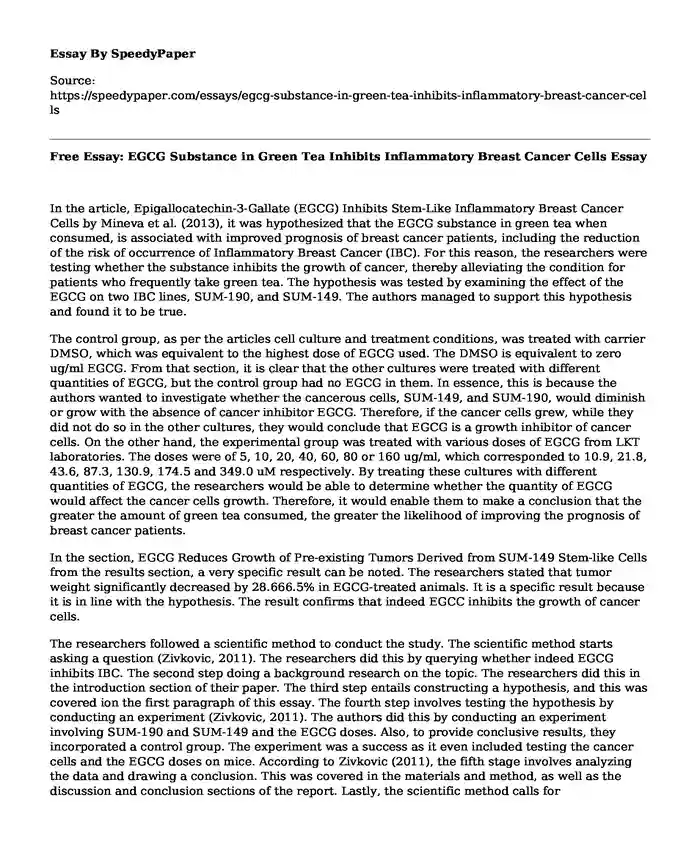In the article, Epigallocatechin-3-Gallate (EGCG) Inhibits Stem-Like Inflammatory Breast Cancer Cells by Mineva et al. (2013), it was hypothesized that the EGCG substance in green tea when consumed, is associated with improved prognosis of breast cancer patients, including the reduction of the risk of occurrence of Inflammatory Breast Cancer (IBC). For this reason, the researchers were testing whether the substance inhibits the growth of cancer, thereby alleviating the condition for patients who frequently take green tea. The hypothesis was tested by examining the effect of the EGCG on two IBC lines, SUM-190, and SUM-149. The authors managed to support this hypothesis and found it to be true.
The control group, as per the articles cell culture and treatment conditions, was treated with carrier DMSO, which was equivalent to the highest dose of EGCG used. The DMSO is equivalent to zero ug/ml EGCG. From that section, it is clear that the other cultures were treated with different quantities of EGCG, but the control group had no EGCG in them. In essence, this is because the authors wanted to investigate whether the cancerous cells, SUM-149, and SUM-190, would diminish or grow with the absence of cancer inhibitor EGCG. Therefore, if the cancer cells grew, while they did not do so in the other cultures, they would conclude that EGCG is a growth inhibitor of cancer cells. On the other hand, the experimental group was treated with various doses of EGCG from LKT laboratories. The doses were of 5, 10, 20, 40, 60, 80 or 160 ug/ml, which corresponded to 10.9, 21.8, 43.6, 87.3, 130.9, 174.5 and 349.0 uM respectively. By treating these cultures with different quantities of EGCG, the researchers would be able to determine whether the quantity of EGCG would affect the cancer cells growth. Therefore, it would enable them to make a conclusion that the greater the amount of green tea consumed, the greater the likelihood of improving the prognosis of breast cancer patients.
In the section, EGCG Reduces Growth of Pre-existing Tumors Derived from SUM-149 Stem-like Cells from the results section, a very specific result can be noted. The researchers stated that tumor weight significantly decreased by 28.666.5% in EGCG-treated animals. It is a specific result because it is in line with the hypothesis. The result confirms that indeed EGCC inhibits the growth of cancer cells.
The researchers followed a scientific method to conduct the study. The scientific method starts asking a question (Zivkovic, 2011). The researchers did this by querying whether indeed EGCG inhibits IBC. The second step doing a background research on the topic. The researchers did this in the introduction section of their paper. The third step entails constructing a hypothesis, and this was covered ion the first paragraph of this essay. The fourth step involves testing the hypothesis by conducting an experiment (Zivkovic, 2011). The authors did this by conducting an experiment involving SUM-190 and SUM-149 and the EGCG doses. Also, to provide conclusive results, they incorporated a control group. The experiment was a success as it even included testing the cancer cells and the EGCG doses on mice. According to Zivkovic (2011), the fifth stage involves analyzing the data and drawing a conclusion. This was covered in the materials and method, as well as the discussion and conclusion sections of the report. Lastly, the scientific method calls for communicating the results, which was covered in the results section.
To surmise, the hypothesis was supported. In the experiments, it was clear that EGCG inhibits the growth of cancer cells. Even as asserted by Ahn et al. (2003), green tea reduces lesions and cancer, and therefore, this study reinforces studies that hold that EGCG is an inhibitor of cancer. For this reason, it can be surmised that the study was a success, and therefore, the EGCG substance in green tea when consumed, is associated with improved prognosis of breast cancer patients, including the reduction of the risk of occurrence of Inflammatory Breast Cancer (IBC). As such, the greater the intake of green tea, the higher the chance of inhibiting the growth of cancer cells.
References
Ahn, W. S., Yoo, J., Huh, S. W., Kim, C. K., Lee, J. M., Namkoong, S. E., & Lee, I. P. (2003). Protective effects of green tea extracts (polyphenon E and EGCG) on human cervical lesions. European journal of cancer prevention, 12(5), 383-390.
Zivkovic, B. (2011). Biology and the Scientific Method. Scientific American Blog Network. Retrieved from http://blogs.scientificamerican.com/a-blog-around-the-clock/bio101-biology-and-the-scientific-method/
Cite this page
Free Essay: EGCG Substance in Green Tea Inhibits Inflammatory Breast Cancer Cells. (2019, Oct 02). Retrieved from https://speedypaper.net/essays/egcg-substance-in-green-tea-inhibits-inflammatory-breast-cancer-cells
Request Removal
If you are the original author of this essay and no longer wish to have it published on the SpeedyPaper website, please click below to request its removal:
- Contract Law Essay Sample with Case Examples
- Navigation Plan Essay, Free Example for You
- Microeconomics Theories, Free Essay for Students
- Free Essay on ISIS Intelligence and Attacks in The US
- Federal Policy Analysis and Recommendations
- Paper Example on Betty Neuman's Theory
- Factual Evidence That AIDS Originated from Monkeys: Argumentative Essay
Popular categories





